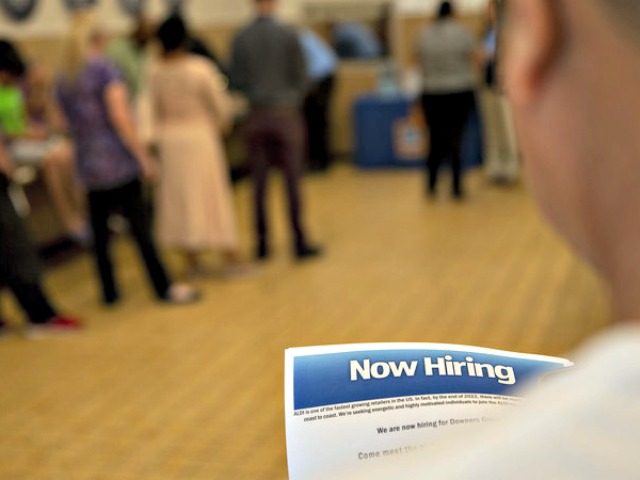A test shows that immigrant college graduates tend to score far below levels reached by U.S. college graduates, says a report released by the Center for Immigration Studies.
The test data is important because business groups have displaced hundreds of thousands of American college graduates while hiring more than one million foreign graduates via the H-1B and other visa worker programs intended for high-skilled temporary foreign workers.
Business advocates say the migrants are highly skilled. But the test shows that foreign graduates of foreign colleges score just 34 out of 100, while Americans score 67 on the 100 point scale. Foreign graduates of American colleges score at 56, or 16 percent lower than the American score.
“Foreign-educated immigrants with a college or advanced degree perform so poorly that they score at the level of natives who have only a high school diploma,” says the report, which analyzed results from the Program for International Assessment of Adult Competencies test.
However, the test of 8,000 people in the United States only includes 210 immigrants who received college degrees abroad, said Jason Richwine, the study’s author. But the fuzziness caused by that small number is countered by the huge disparity between the foreigners’ scores and the Americans’ score, he said. “The results are robust,” he said.
The study could be expanded to include more people if the government-funded census and the American Community Survey asked immigrants where they earned their college degrees, he said.
For now, the surveys only ask immigrants how many years of education they have earned, and those answers are unreliable, Richwine said. For example, immigrants may have earned credentials by spending several years in low-quality universities or high-quality universities, he said. There also may be some complicating factors, such as cheating, partly because many migrants come from cultures where academic credentials “make a difference between what they see as failure and success in life,” he added.
Another complication is the distribution of scores, he said. For example, a national survey may hide a successful group of high scorers underneath a larger number of very low scores. Each problem may be more prevalent in some countries than in others, he said, so “an education credential [claimed by an immigrant] does not mean much because of how unreliable it turns into skills across countries.”
Advocates for greater immigration say current immigrants have more credentials than immigrants from several years ago. But “we just don’t know that is true,” said Richwine. “Certainly, the census data shows that recent immigrants say they have more years of education. But to argue that the immigration pool is becoming substantially more skilled is way too premature.”
The English language media in India has repeatedly discussed the skills issue, partly because many college graduate Indians wish to migrate to the United States, either as a visa worker or as legal immigrants. There are at least 500,000 Indian visa workers in U.S college jobs.
The skill issue is also visible on websites created for Indian visa workers in the United States. Some of the sites include advertisements for “job support” services which allow unskilled Indian visa workers in American to do their U.S. jobs with the aid of online advice and work by skilled Indians in India.
In 2016, India’s minister for “Human Resource Development” was transferred to a different job amid evidence that she inflated her educational qualifications.
The difficulty of measuring the skills of “high skilled” immigrants is part of the growing fight over the H-1B outsourcing program, and the bipartisan push to remove “country caps” on the government’s annual allotment of valuable green cards to lower-wage visa workers.
A bill would provide a fast track to green cards for at least 200,000 Indian H-1B workers — plus their spouses and children — and would make it more difficult for young Americans graduates to win starter jobs in the information technology sector.
The authors of the Senate bill — S. 386 — are GOP Sen. Mike Lee and Democratic Sen. Kamala Harris. Their February 7 statement says “the bill has also been endorsed by Immigration Voice, Compete America Coalition, the Information Technology Industry Council, Google, Microsoft, The Heritage Foundation, La Raza, and many others.”
The Senate co-sponsors of the outsourcing bill include Republicans and Democrats:
-
- Sen. Roy Blunt (R-MO)
- Sen. Susan Collins (R-ME)
- Sen. Jim Moran (R-KS)
- Sen. Tom Carper (D-DE)
- Sen. Ron Wyden (D-OR)
- Sen. Maria Cantwell (D-WA)
- Sen. Cory Gardner (R-CO)
- Sen. Tom Cotton (R-AR)
- Sen. Tammy Baldwin (D-WI)
- Sen. Jeff Merkley (D-OR)
- Sen. Michael Bennet (D-CO)
- Sen. Kevin Cramer (R-ND)
- Sen. Krysten Sinema (D-AZ)
The matching House bill is numbered H.R. 1044. It is being pushed by Colorado Republican Rep. Ken Busk and California Democratic Rep. Susan Lofgren.
Business groups also say they need to import visa workers because there is a shortage of American professionals.
However, data produced by the Bureau of Labor Statistics show that there are 1.3 million Americans employed in telecommunications, data processing, Internet hosting services, and “other information services.” There are also 20 million Americans working in professional and technical services including two million people working in computer systems design, 1.4 million in consulting.

COMMENTS
Please let us know if you're having issues with commenting.